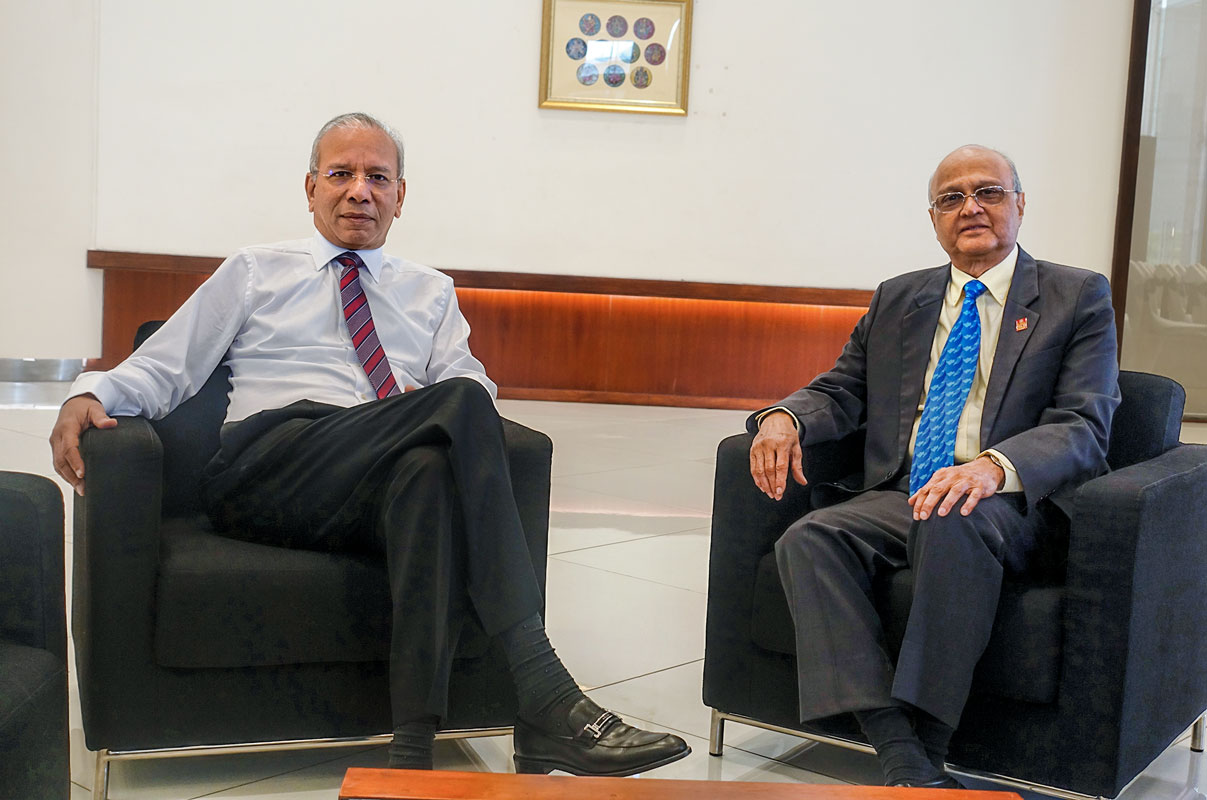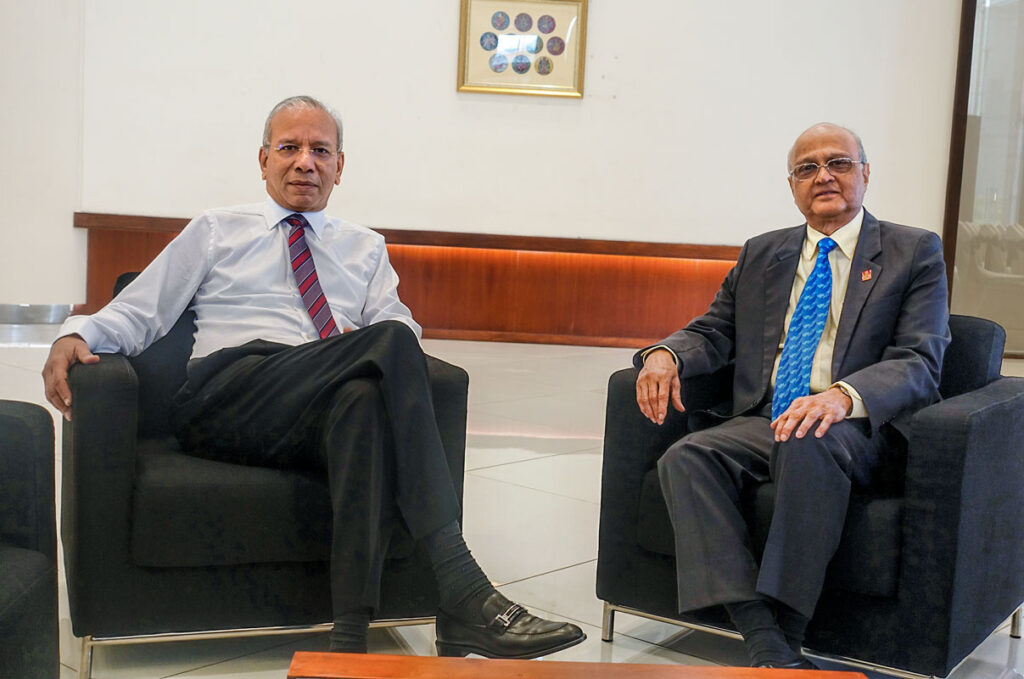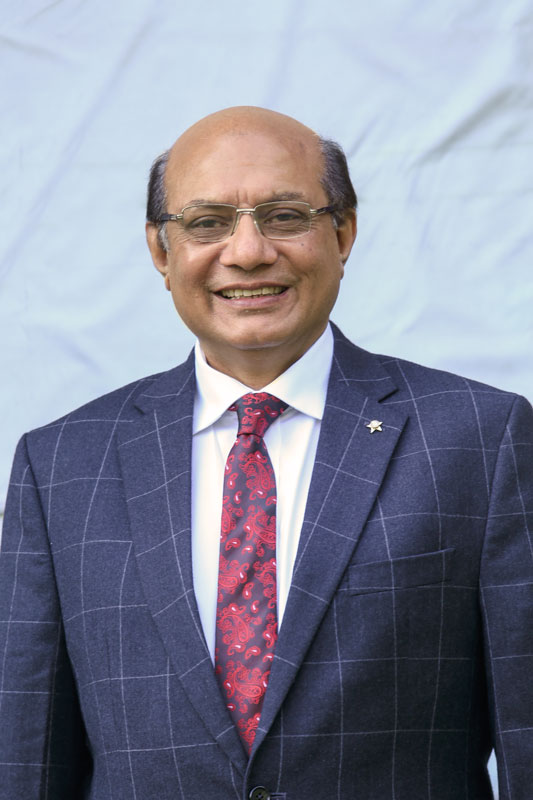
Rotary’s peace programmes are not popular in our part of the world. It is a pity that we do not place much emphasis on them; I think we should,” said TRF Trustee Chair K R Ravindran addressing the virtual TRF seminar for zones 4,5,6,7 recently.
“Our peace programmes are the mainstay for many US Rotarians. They are attracted to the prospect that our Foundation tangibly contributes to world peace.” Beyond being a catalyst for drawing funds to the Foundation, the peace programmes have also produced some outstanding alumni who have contributed in their own way to the cause of peace, he added.
The Trustee Chair cited the success story of Manuela Mot, a peace scholar from Duke University, US, in bringing truce to the Mindanao islands in the Philippines, plagued with conflict for almost 60 years since 1960. “In 2019 she spent a month evaluating and processing a World Bank investment proposal on the island. This brought together the warring Christians and Muslims to the table because they all wanted the same thing — the vast infrastructure development in the island.”
Another great example of working for peace through service was the declaration of a polio-free Africa. “We applauded the health workers, mainly women, who travelled throughout the country with the polio vaccine to reach out to every child. Many of these places are riddled with conflicts. So we celebrated them this year by opening Rotary’s eighth peace centre, which is the first in Africa at the Makerere University in Uganda.”
Ravindran went on to narrate the genesis of the Rotary peace centres. “At one time we wondered if Rotary can build a university dedicated to peace studies.” As the dream gathered dust, PRIP Rajendra Saboo, then a TRF trustee, got a brainwave to establish a peace centre at the prestigious Kellogs School of Business, an existing institution, instead of building a new one. He shared the idea with the then TRF Chair Paulo Costa and PRIP Luis Giay, and was authorised to form a committee. This was the forerunner to the present Rotary peace centres. Today there are eight peace centres in seven universities with the Duke University and the University of N Carolina in the US sharing one centre. The other centres are in Japan, UK, Australia, Sweden, Thailand and Africa. Fifty students graduate with a Masters’ degree in peace and developmental studies each year from these centres. “We may not be able to stop wars. But we are training enough individuals who can be placed in positions where they can negotiate for peace.”
Many of us think that peace is absence of war. Yet there are many who do not know what the absence of peace is.
— K R Ravindran, TRF Trustee Chair
He shared a close encounter with a war spillover at his home town in Colombo. It happened when a van, filled with plastic explosives driven by two suicide bombers, was stopped by six security guards at the gates of the Forward Command headquarters of the Defence Ministry in Colombo. The suicide bombers detonated the chargers killing all eight. The roof of the building was blown off and about 15 houses in the vicinity, including Ravindran’s, suffered damages.
About 21 people were killed and 175 injured including the young children studying in the nursery wing of a school nearby. “This happened in June 1991 just before I took over as DG. When the bomb went off it shattered windows of my house more than a km away. My wife knew instinctively that it came from the direction of our daughter Prashanti’s school. That morning, one moment she was holding a new pencil she had bought at the school shop and the next moment she was flung to a side, the air filled with sand and her ears ringing. Everywhere around her she could see children running, screaming and bleeding. She remembers the roof collapsing, and everybody huddled on the ground with the teachers and waiting for their parents. We went and brought her home which was filled with broken glass and her favourite dog had splinters on its back.”
That war in Sri Lanka lasted 25 years. It killed 100,000 people and displaced countless more.
“Many of us think that peace is absence of war. Yet there are many who do not know what the absence of peace is,” said Ravindran.
He highlighted that last year 76,000 people died in Syria, around 14,000 in Afghanistan and 15,000 in Africa in the countries of the Boko Harem insurgency. A war does not end with a truce sign. The effects linger on the people who have gone through it — the financial impact, families that have lost breadwinners, infrastructure that never got built, the resources that were diverted for so many years towards the fighting. This apart, the trauma and the many memories that none of us can ever forget.
Referring to the song by Jill Jackson written in 1955 — Let there be peace on Earth — he said, “the second line tugs at my heart every time it is sung — Let there be peace on earth; and let it begin with me.” He added that peace must be enshrined in each one of us and must show in the way we conduct ourselves. “It means we must disagree in an agreeable manner and limit our disagreement to that issue and move on.”
RI Director Kamal Sanghvi urged the incoming district governors to inspire Rotarians to give generously to the Foundation. “The saying that money cannot buy happiness is false. Your money can give happiness for the poor and the needy. This seminar will help you understand the magnanimity of the Foundation and the joy of giving,” he said.
RID Bharat Pandya alerted the delegates saying that the Annual Fund is lagging across the world. “It is the engine that drives the Foundation and if this scenario continues for the next five years, things will get derailed. Our service projects will suffer. It does not require a huge donation but any amount from $25 to $1,000 regularly would suffice,” he said.
TRF Technical Cadre Chair PRID Manoj Desai urged the DGEs to “invite cadre members to address your district TRF seminars. Their guidance will help you get your GG approved by the Foundation.”
RIDE Mahesh Kotbagi explained why some trustee decisions may not be suitable for some countries or districts. “Trustees have to think globally and cannot limit their plans to a particular region,” he said, and urged the DGEs to utilise their DDF for what they were meant for.
Trustee Gulam Vahanvaty, who anchored the seminar, appreciated the fact that India continues to retain its second rank in total giving to TRF for the fifth consecutive year. Until Dec 2020, donors from the four zones have contributed $5.7 million to TRF which is more than the figure during the same period last year. The total value of district and global grants for all four zones during 2019–20 was $41.7 million. In comparison, its value during the six months ending Dec 2020 has exceeded $25 million, he observed.
AKS members Ravishankar Dakoju, Dr Krishnendu Gupta and Vikram Reddy inspired the delegates to contribute generously to the Foundation and PDG Sam Patibandla spoke on how to become a Bequest Society member.
RIDE A S Venkatesh moderated a panel discussion titled Joy of Giving, in which AKS members Amita Anand Mohindru, past president of RC Delhi City; RID 3131 DG Rashmi Kulkarni and Saif Qureshi, past president of RC Bombay Pier, participated.
“A chat over coffee at Evanston with Ravishankar and Paola Dakoju inspired me to become an AKS member. I was reminded of the book, The monk who sold his Ferrari,” said Amita. If you are appointed trustee chair for a day what change will you want to bring to TRF? asked Venkatesh. Amita’s answer: “I would like to put in place an SoP for approval of grants. When I was president, I found one grant being approved in three months, but another similar one took six months. We were answerable to the corporates as CSR funds were involved and we didn’t have an explanation for the delay. Our reputation was at stake.”
Rashmi said that she “liked the fact that the money we give to TRF through the Endowment Fund will come back to us as DDF and will help my club execute global grant projects, not just now, but also after we pass on.” She said more efforts should be made to educate people about the Foundation. “Still many think that it is a fundraising body. In truth, our Foundation does much more than that. Enlightening people about its power will encourage people to contribute liberally,” she added.
On how he would describe Rotary to his non-Rotarian friends, Qureshi said that generally when friends meet they discuss politics, economy or budget. “But when Rotarians meet we discuss service projects and the impact they create in communities. We share a common bond and passion for doing good in communities. The friendship among Rotarians is far deeper than a few drinks and food. We tend to hang out with each other like birds of a feather.”








